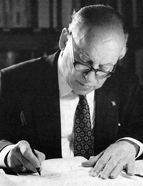

While overseas expansion and the Empire were another area of his research and teaching, Brazil occupied a privileged place. On the occasion of the 400th anniversary of Rio de Janeiro in 1965, he published O Rio de Janeiro no século XVI (Rio de Janeiro in the 16th century), vol. I. Estudo Histórico (Historical Study), vol. II, Documentos dos Arquivos Portugueses (Documents from the Portuguese Archives). However, the great impetus given to relations with Brazil resulted from contacts between the Historical and Geographical Institute of Rio de Janeiro and the Portuguese Academy of History, while he was its president. This success triggered a network of exchanges that gradually extended to Historical and Geographical Institutes in other states, thus consolidating the desired closer cultural ties and friendship with the immense Luso-Brazilian universe. Of particular note is his participation in the major anthology Iberoamérica. Una comunidad (1989), to which he contributed eight texts. In recognition of Joaquim Veríssimo Serrão’s merit in this rapprochement, in 1978 the Brazilian Academy of Letters elected him as a member. The link with Brazil was the starting point for expansion into the vast Ibero-American world, based on institutional models. This expansion has resulted in the Academy of Spanish History and its counterparts in American countries now forming part of this cultural universe. Veríssimo Serrão was the great driving force behind the construction of this cultural universe and is therefore a natural member of each of these academies and co-founder of the Association of Academies of Ibero-America.
In the first volume of his History of Portugal (1977), he explained his purpose in writing it: “History was conceived with love for Portugal, showing the greatness of the nation we were – how and why we were – in order to extract from the work the lessons that the present imposes” [Correspondence with Marcelo Caetano, p.19]. dds: “Research is not just a need to fill the spirit, but a moral obligation for those who believe in the teachings of the past” (Idem, p. 49). He notes the style chosen: “This is a history viewed in its global aspect, halfway between pedantic erudition and dissemination without notes, so that the reader is not bored. But also so as not to leave them without answers to the thousand problems that the origin of nationality raises for the people of our time” (Idem, p. 55). The initial plan for three volumes was gradually expanded, which he justified in the prefaces as they were published, eventually reaching 18, which he completed in 2011. It is a very extensive work, with a thematic scope that integrates, in a coherent discursive structure, the aspects to which he devoted his work as a historian. It articulates the political, diplomatic, overseas, economic, social, demographic, welfare, religious and cultural dimensions: “a great canvas of the Portuguese historical journey (...) an overview of the various manifestations of our collective life, conceived as multidimensional knowledge” (Ler História, p. 140). One of the merits of this History lies not only in its temporal scope – from the beginnings of nationality to the late 20th century – but also in the fact that it is the work of a single historian, a case without parallel in contemporary historiography and perhaps unrepeatable. It is indisputable that this work has projected the history of Portugal abroad, thanks to the global vision it presents, its documentary basis, the coherent articulation of its facets and the clarity of its exposition, in keeping with the conception of history that he always advocated and wrote about.
This work is financed by national funds through FCT - Foundation for Science and Technology, I.P, in the scope of the projects UIDB/04311/2020 and UIDP/04311/2020.
